跨文化交际翻译练习
跨文化交际试题答案(附翻译)

跨文化交际试题答案(附翻译)一、选择题1. 以下哪项不是跨文化交际的核心要素?A. 语言差异B. 文化差异C. 沟通技巧D. 民族风俗答案:D翻译:Which of the following is not a core element of intercultural communication?A. Linguistic differencesB. Cultural differencesC. Communication skillsD. Folk customs2. 跨文化交际中,以下哪项行为可能导致误解?A. 打招呼B. 鞠躬C. 直接拒绝D. 礼貌地表达意见翻译:In intercultural communication, which behavior may lead to misunderstandings?A. GreetingB. BowingC. Direct refusalD. Politely expressing opinions二、填空题1. 跨文化交际中的文化差异主要体现在____、____、____等方面。
答案:价值观、行为规范、语言使用翻译:The cultural differences in intercultural communication are mainly reflected in values, behavioral norms, and language use.2. 跨文化交际能力包括____、____、____等方面。
答案:知识、技能、态度翻译:Intercultural communication competence includes knowledge, skills, and attitudes.三、简答题1. 简述跨文化交际的重要性。
跨文化交际在全球化背景下具有重要意义。
以下是跨文化交际的重要性:(1)促进国际交流与合作:跨文化交际有助于不同国家和地区的人们相互了解,增进友谊,促进国际合作。
跨文化交际

1. He’s just a green recruit fresh from college.缺乏经验的;不成熟的;幼稚的
翻译:他是个刚从大学毕业征召入伍的新兵。
2.I tried to call her many times but she was in a brown study and didn’t hear me.
深思,出神a state of deep absorption or thoughtfulness
翻译:我叫了她好几声,但她一直在沉思当中,并没有听见我的声音。
3. One day, out of the blue, a girl rang up and said she was my sister. 忧郁;沮丧;悲伤翻译:某天,出乎意料地,一个女孩给我打电话说她是我妹妹。
4. The new office block has unfortunately become an expensive white elephant.
累赘物,摆设物
翻译:这座新的办公楼步行地成了昂贵的摆设。
5.Mary was always regarded as t he black sheep of the family.
害群之马,败类,败家子
翻译:Mary总是被认为是败家子。
6. You’d better do something to prove you’re not yellow. 胆怯的
翻译:你最好做出点什么来证明你不是胆小鬼。
7.Can you see the green in her eyes? Green: adj. 由强烈感情影响的;嫉妒的。
翻译:你能看出她眼中的嫉妒之情吗?。
跨文化交际李成明unit2-A原文+翻译DOCX
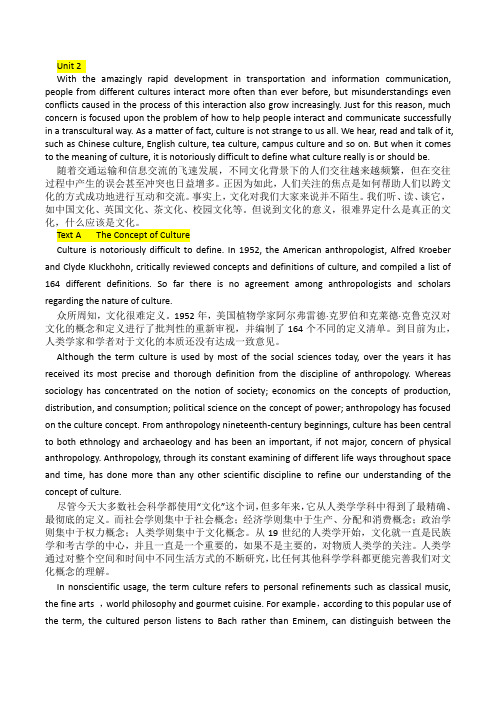
Unit 2With the amazingly rapid development in transportation and information communication, people from different cultures interact more often than ever before, but misunderstandings even conflicts caused in the process of this interaction also grow increasingly. Just for this reason, much concern is focused upon the problem of how to help people interact and communicate successfully in a transcultural way. As a matter of fact, culture is not strange to us all. We hear, read and talk of it, such as Chinese culture, English culture, tea culture, campus culture and so on. But when it comes to the meaning of culture, it is notoriously difficult to define what culture really is or should be.随着交通运输和信息交流的飞速发展,不同文化背景下的人们交往越来越频繁,但在交往过程中产生的误会甚至冲突也日益增多。
正因为如此,人们关注的焦点是如何帮助人们以跨文化的方式成功地进行互动和交流。
事实上,文化对我们大家来说并不陌生。
我们听、读、谈它,如中国文化、英国文化、茶文化、校园文化等。
新编跨文化交际【warm up】 原文及翻译
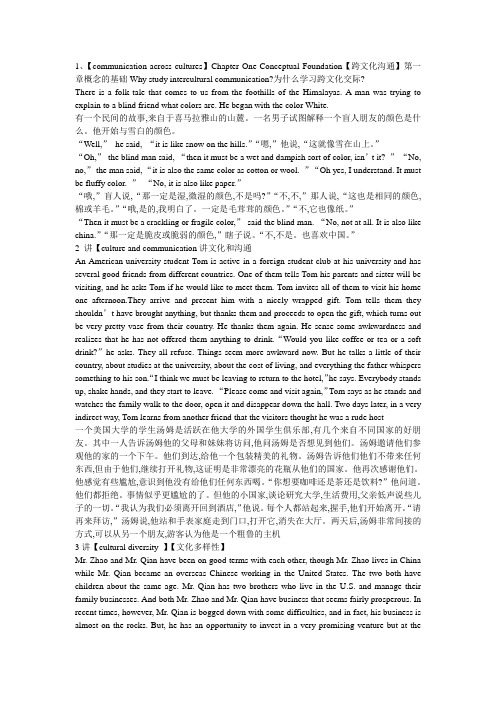
1、【communication across cultures】Chapter One Conceptual Foundation【跨文化沟通】第一章概念的基础Why study intercultural communication?为什么学习跨文化交际?There is a folk tale that comes to us from the foothills of the Himalayas. A man was trying to explain to a blind friend what colors are. He began with the color White.有一个民间的故事,来自于喜马拉雅山的山麓。
一名男子试图解释一个盲人朋友的颜色是什么。
他开始与雪白的颜色。
“Well,”he said, “it is like snow on the hills.”“嗯,”他说,“这就像雪在山上。
”“Oh,”the blind man said, “then it must be a wet and dampish sort of color, isn’t it? ”“No, no,”the man said, “it is also the same color as cotton or wool. ”“Oh yes, I understand. It must be fluffy color. ”“No, it is also like paper.”“哦,”盲人说,“那一定是湿,微湿的颜色,不是吗?”“不,不,”那人说,“这也是相同的颜色,棉或羊毛。
”“哦,是的,我明白了。
一定是毛茸茸的颜色。
”“不,它也像纸。
”“Then it must be a crackling or fragile color,”said the blind man. “No, not at all. It is also like china.”“那一定是脆皮或脆弱的颜色,”瞎子说。
跨文化交际Chapter 1部分翻译
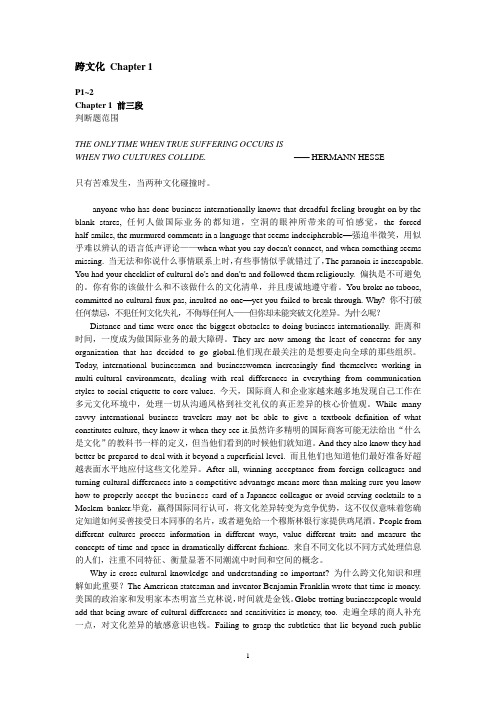
跨文化Chapter 1P1~2Chapter 1 前三段判断题范围THE ONLY TIME WHEN TRUE SUFFERING OCCURS ISWHEN TWO CULTURES COLLIDE. —— HERMANN HESSE只有苦难发生,当两种文化碰撞时。
anyone who has done business internationally knows that dreadful feeling brought on by the blank stares,任何人做国际业务的都知道,空洞的眼神所带来的可怕感觉,the forced half-smiles, the murmured comments in a language that seems indecipherable—强迫半微笑,用似乎难以辨认的语言低声评论——when what you say doesn't connect, and when something seems missing.当无法和你说什么事情联系上时,有些事情似乎就错过了,The paranoia is inescapable. You had your checklist of cultural do's and don'ts and followed them religiously.偏执是不可避免的。
你有你的该做什么和不该做什么的文化清单,并且虔诚地遵守着。
You broke no taboos, committed no cultural faux pas, insulted no one—yet you failed to break through. Why?你不打破任何禁忌,不犯任何文化失礼,不侮辱任何人——但你却未能突破文化差异。
为什么呢?Distance and time were once the biggest obstacles to doing business internationally.距离和时间,一度成为做国际业务的最大障碍。
跨文化交际中翻译错误的例子
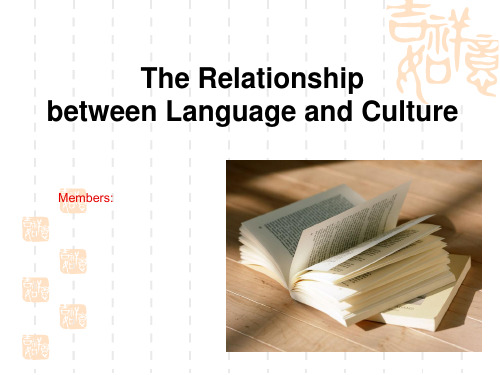
If your foreign friend spent much time to help you to solve your problem. In China, we maybe say “对不起,浪费了你这么多宝贵 的时间”. So can you translate it into “I’m sorry to have wasted much of your precious time”? Why and what shall we say?
Dog eats dog & 狗咬狗 Love me, love my dog.(爱屋及乌); a top dog (优胜者,左右全局的人); a gay dog(快活人); a sea dog(老练水手); a water dog (水性好的人); to help a lame dog over a stile(助人于为难) You are a lucky dog.(你真幸运) Better be the head of a dog than the tail of a lion. (宁为鸡头,勿为牛后)
Learning a foreign language is inseparable from learning its culture.
中国菜谱翻译成西方菜谱的错误例子四喜丸子翻译成四个高兴的肉团fourgladmeatballs猴魁茶翻译成第一只猴子茶numberonemonkeytea红烧狮子头翻译成烧红了的狮子头stewedlionhead麻婆豆腐翻译成满脸雀斑的女人制作的豆腐beancurdmadepockmarkedwoman童子鸡翻译成了还没有性生活的鸡chickenwithoutsexuallifelearningforeignlanguageinseparablefromlearningitsculture
跨文化交际+各种谚语的翻译

1、趁热打铁;
当断不断,必受其患。
2、事实胜于雄辩;
不入虎穴,焉得虎子。
3、人不是只为面包而活着;
乘机行事,抓紧时机。
4、自助者天助;
凭自身的力量重新振作起来;
9. To know the road ahead, ask those coming back.
10. One does not make the wind, but is blown by it.
11. Fall seven times, stand up eight.
12. A man’s tongue is his sword.
15、团结就是力量。
16、一言既出,驷马难追。
17、各人自扫门前雪。
18、人要正视自身的可能性。
19、撒谎者易逝。
7.Variety is the spice of life, Lightning never strikes twice in the same place, and There is more than one way to skin a cat.
8. God gave us the nuts but he doesn’t crack them and What you can do today, don’t postpone until tomorrow.
4. God helps those who help themselves, Pull yourself up by your bootstraps, and No pain, no gain.
大学英语跨文化交际教程翻译 杨晓萍 陶岳炼 主编
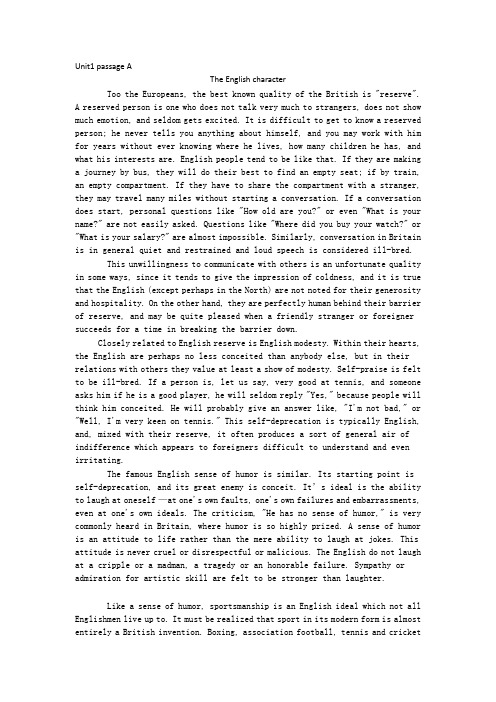
Unit1 passage AThe English characterToo the Europeans, the best known quality of the British is "reserve".A reserved person is one who does not talk very much to strangers, does not show much emotion, and seldom gets excited. It is difficult to get to know a reserved person; he never tells you anything about himself, and you may work with him for years without ever knowing where he lives, how many children he has, and what his interests are. English people tend to be like that. If they are making a journey by bus, they will do their best to find an empty seat; if by train, an empty compartment. If they have to share the compartment with a stranger, they may travel many miles without starting a conversation. If a conversation does start, personal questions like "How old are you?" or even "What is your name?" are not easily asked. Questions like "Where did you buy your watch?" or "What is your salary?" are almost impossible. Similarly, conversation in Britain is in general quiet and restrained and loud speech is considered ill-bred.This unwillingness to communicate with others is an unfortunate quality in some ways, since it tends to give the impression of coldness, and it is true that the English (except perhaps in the North) are not noted for their generosity and hospitality. On the other hand, they are perfectly human behind their barrier of reserve, and may be quite pleased when a friendly stranger or foreigner succeeds for a time in breaking the barrier down.Closely related to English reserve is English modesty. Within their hearts, the English are perhaps no less conceited than anybody else, but in their relations with others they value at least a show of modesty. Self-praise is felt to be ill-bred. If a person is, let us say, very good at tennis, and someone asks him if he is a good player, he will seldom reply "Yes," because people will think him conceited. He will probably give an answer like, "I'm not bad," or "Well, I'm very keen on tennis." This self-deprecation is typically English, and, mixed with their reserve, it often produces a sort of general air of indifference which appears to foreigners difficult to understand and even irritating.The famous English sense of humor is similar. Its starting point is self-deprecation, and its great enemy is conceit. It’s ideal is the ability to laugh at oneself —at one's own faults, one's own failures and embarrassments, even at one's own ideals. The criticism, "He has no sense of humor," is very commonly heard in Britain, where humor is so highly prized. A sense of humor is an attitude to life rather than the mere ability to laugh at jokes. This attitude is never cruel or disrespectful or malicious. The English do not laugh at a cripple or a madman, a tragedy or an honorable failure. Sympathy or admiration for artistic skill are felt to be stronger than laughter.Like a sense of humor, sportsmanship is an English ideal which not all Englishmen live up to. It must be realized that sport in its modern form is almost entirely a British invention. Boxing, association football, tennis and cricketwere all first organized and given rules in Britain. Rules are the essence of sport, and sportsmanship is the ability to practise a sport in obedience to its rules, while also showing generosity to one's opponent and good temper in defeat. Moreover, sportsmanship as an ideal is applied to life in general. One of the most elementary rules of life is "never hit a man when he's down"─in other words, never take advantage of another person's misfortune. English school-boys often show this sense of sportsmanship to a surprisingly high degree in their relations with each other.译文:对于其他欧洲人来说,英国人最著名的特点是“谨慎”。
- 1、下载文档前请自行甄别文档内容的完整性,平台不提供额外的编辑、内容补充、找答案等附加服务。
- 2、"仅部分预览"的文档,不可在线预览部分如存在完整性等问题,可反馈申请退款(可完整预览的文档不适用该条件!)。
- 3、如文档侵犯您的权益,请联系客服反馈,我们会尽快为您处理(人工客服工作时间:9:00-18:30)。
Translate the following paragraphs into Chinese.
1. People in Paris eat snails, but people in San Diego put poison on them. Why? People in Tabriz or Tehran sit on the floor and pray five times each day, but people in Las V egas stand up all night in front of slot machines. Why? Some people speak Tagalog, others speak English. Why? Some people paint and decorate their entire bodies, but others spend millions of dollars painting and decorating only their faces. Why? The general answer to these questions is the same. People learn to think, feel, believe, and strive for what their culture considers proper. People respond to the world through the messages they receive, but it is culture that determines, to a large extent, the form, pattern, and content of those messages. Culture also determines the content and conformation of the messages we send. This omnipresent quality of culture leads Hall to conclude that “there is not one aspect of human life that is not touched and altered by culture.” In many ways, Hall is correct: culture is everything and everywhere. And more importantly, at least for our purposes, culture and communication work in tandem. In fact , they are inseparable: it is often difficult to decide which is the voice and which the echo.
2. There are six barriers to communication----anxiety, assuming similarities instead of differences, ethnocentrism, stereotypes and prejudice, nonverbal misinterpretations and language problems. Anxiety is feeling nervous, which can affect communication when you focus so much on your own feelings that you do not pay attention to what other people are telling you. If you are speaking to someone in your second language, you may worry that the other person may speak too fast or will use words you do not understand. Anxiety may also affect your ability to communicate your ideas to others. If you are in a situation where you feel very nervous, such as talking to your boss, you may find yourself saying awkward things or even making mistakes in grammar that you never do when talking with your friends.
Individualism-oriented cultures hold individual interests and goals as most important while in collectivism-oriented cultures group interests and goals precede over those of the individual. Most Western countries value individualism and people strive hard to achieve individual identity in terms of possessions and achievement in their professions. Many eastern countries place high value on the collective. Sometimes individuals have to sacrifice their own interests to achieve what is good for the group.
3. When studying stereotypes, prejudice, and racism, you may be struck with the role that communication can play in either spreading the beliefs or stopping their spread. Prejudice and racism are commonly viewed as being rooted in the child’s early socialization and fostered in communication with other people who are prejudiced or racist.
4. Here is an important point to bear in mind. Chinese learners of English tend to assume that when it is their turn to speak, they must speak accurately, completely, fluently and without any hesitation. If they cannot do so, they begin to blush and lose confidence. In actual fact they have made a unreasonable demand on themselves. In natural conversation, it is quite common that native speakers of English make grammatical mistakes, hesitate a lot, make a false start, use words or expressions that they regret using them later. The point you should bear in mind is that when you are engaged in spontaneous conversation (i. e. natural conversation), your goal is to get your ideas across. Do not worry about hesitation, misuse of words, too many pauses, etc. Nobody, not even a native speaker, is free from these flaws. Y ou can use those meaningless but useful syllables to gain time.。
